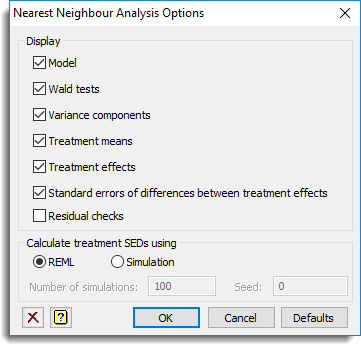Selects information to be printed by the Nearest Neighbour Analysis menu.

Display
This specifies which items of output are to be produced by the analysis.
| Model | Details of the model that is fitted |
| Wald tests | Wald tests of the fixed effects |
| Variance components | Estimated variance components |
| Treatment means | Estimated treatment means |
| Treatment effects | Estimated treatment effects (note these are centred to sum to zero) |
| Standard errors of differences between treatment effects | Symmetric matrix of standard errors of differences between treatment effects |
| Residual checks | Uses the VCHECK procedure to check the residuals for outliers and variance stability |
Calculate treatment SEDs using
Specifies the method used in estimating the standard errors of differences.
| REML | Use the residual maximum likelihood estimators of the SEDs |
| Simulation | Use simulation where random terms with the estimated variance components are simulated to estimate the SEDs |
Number of simulations
This defines the number of simulations to use when calculating the SEDs by simulation, and must be a positive integer. Using a large value takes longer, but gives a more precise estimate of the SEDs (assuming that the data do follow the nearest neighbour model).
Seed
This defines the seed to initialize the random number generation used for calculating the SEDs by simulation. A zero value initializes this from the computer clock, or a nonzero value gives repeatable results.
Action buttons
| OK | Save the option settings and close the dialog. |
| Cancel | Close the dialog without making any changes. |
| Defaults | Reset the options to their default settings. |
Action Icons
| Clear | Clear all fields and list boxes. | |
| Help | Open the Help topic for this dialog. |
See also
- Nearest Neighbour Analysis menu.
- Store dialog for saving the results from the analysis.
- VCHECK procedure to check the residuals.